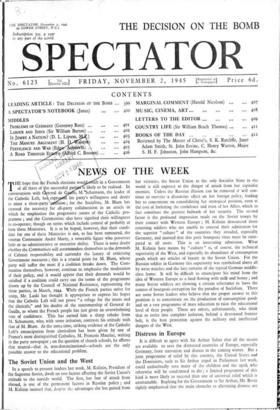\•\. NEVV3S OF THE WEEK
THE hope that tlae French elections woul of all three of ' he successful p
ult in a Government is likely to be realised. In conversations with neral de G e, M.'Schumann, the leader of the Catholic Left, ha expr his party's willingness and desire mon ; for the Socialists, M. Blum has
to enter a three-party stressed the necessity for all-party collaboration in an article in which he emphasises the progressive nature of the Catholic pro- gramme ; and the Communists also have signified their willingness to co-operate, though on terms which include control of probably at least three Ministries. It is to be hoped, however, that their candi- date for one of these Ministries is not, as has been rumoured, the veteran Communist Andre Marty, a venerable figure who possesses little or no administrative or executive ability. There is some doubt whether the Communists will accommodate themselves to the demands of Cabinet responsibility and surrender the luxury of criticising Government measures ; this is a crucial point for M. Blum, whose party will suffer the most if a coalition breaks down. The Com- munists themselves, however, continue to emphasise the moderation of their policy, and it would appear that their demands would be satisfied if a coalition could carry out the terms of the programme drawn up by the Council of National Resistance, representing the three parties, in March, 1944. While the French parties strive for unity, Mr. Laski has thought it appropriate to express his hopes that the Catholic Left will not prove "a refuge for the trusts and the clericals," and his doubts of the statesmanship of General de Gaulle, to whom the French people has just given an overwhelming vote of confidence. This has earned him a sharp rebuke from M. Schumann, who, with some irritation, contrasts his attitude with that of M. Blum. At the sama time, striking evidence of the Catholic Left's emancipation from clericalism has been given by one of France's most distinguished Catholics, M. Francois Mauriac, writing in the party newspaper ; on the question of church schools, he affirms that neutral—that is, non-denominational—schools are the only possible answer to the educational problem.






























